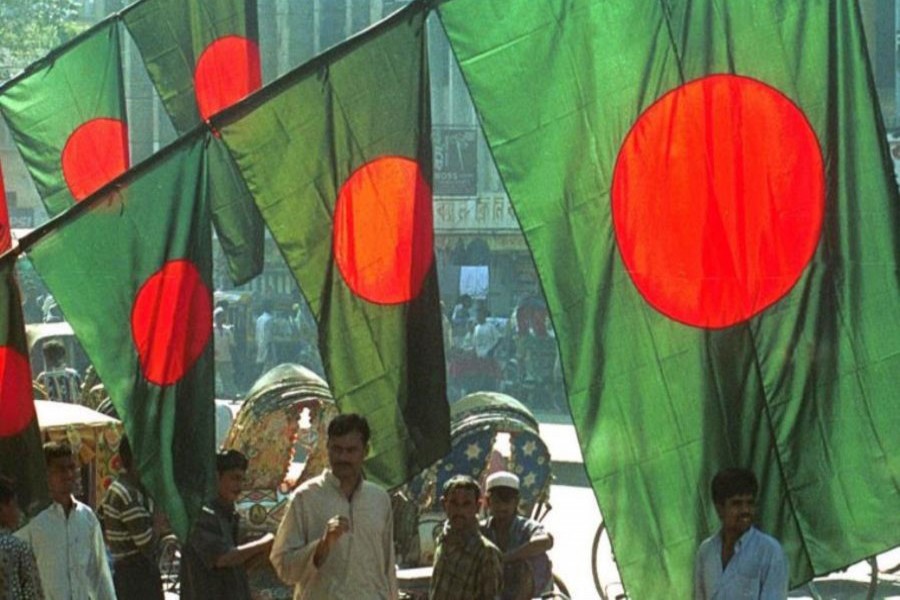
Published :
Updated :

The nation celebrates the 48th Independence and National Day today with Bangladesh emerging as a thriving economy with notable success in many socio-economic indicators.
The aspiration of the people to make some significant inroads globally is no more a distant dream. Hard work and continued struggle against natural disasters, domestic political turmoil and periodical global uncertainty has paid off.
Once known as one of the poorest and beggar nations with acute poverty and hunger, the country now outstrips India and Pakistan in the fight against hunger.
The latest global hunger index, prepared by the IFPRI, placed Bangladesh in a better position as its score improved to 27.1 this year from 32.4 in 2008 ahead of India and Pakistan. Pakistan scored 33.4 against 35.1 previously while India bettered its score to 28.5 from 36 (A lower score indicates improvement in hunger condition).
After nine months of bloody war, Bangladesh emerged an independent and sovereign country on December 16, 1971.
But the cost of gaining rightful independence was very high. During the nine-month war, Pakistani occupation forces along with their local collaborators brutally killed three million people and perpetrated atrocities on 0.20 million women.
Today, Bangladesh is well ahead of most of the countries in gender parity. The Global Gender Gap Index 2017, released by the World Economic Forum (WEF), showed that the country ranked 47th among 144 nations while the ranks of India and Pakistan were 108th and 143rd respectively.

Country's performance in overall human development is also encouraging. It stands 139th among 188 countries in the UNDP Human Development Index 2016 while Pakistan stands far behind at 147.
During the nine-month war, almost all the physical infrastructure was left ruined with little resources available to rebuild the country.
Bangladesh is now constructing a multipurpose bridge over the mighty river Padma. This is the most challenging infrastructure project in the history of Bangladesh. The World Bank withdrew itself from the project on the allegation of corruption. But the government decided to continue the project with domestic financing.
Made in Bangladesh is very much reality, when it comes to the global clothing industry. The country becomes the third largest clothing exporter after China and European Union (EU) in the global market while India is fifth.
Bangladesh also emerges a pioneer of green garments or environment-friendly clothing production units.
Projection based on the International Monetary Fund (IMF) estimate shows that Bangladesh, now 43rd economy in the world, will be 42nd this year in terms of nominal GDP (gross domestic product) while Pakistan will be 45th. And by 2022, Bangladesh and Pakistan will be 40th and 44th largest economies of the world.
Bangladesh's per capita GDP stood at $1,538, which is higher than that of Pakistan's $1,470, according to The Economist.
In terms of PPP (Purchasing Power Parity) GDP, Pakistan is still ahead of Bangladesh.
Bangladesh is a much more inclusive nation now, as it stands in the 34th position among 74 emerging countries included in the Global Inclusive Development Index 2018 (WEF). The positions for Pakistan and India are 47 and 62.
The country is now a Test cricket nation which also reflects the passion for sports.
Bangladesh's nation brand value is also rising gradually. According to the Nation Brands 2017, a research work of London-based Brand Finance, the value of Bangladesh stands at $208 billion while it is $128 billion for Pakistan.
In 2015, Bangladesh became a Lower Middle-Income Country from a Low-Income Country as per parameters set by the World Bank.
Now this March, Bangladesh formally fulfilled all three criteria to graduate from the Least Developed Country (LDC) status on the path to become a developing nation fully by 2024.
No doubt, a lot of challenges still lie ahead. Growing socio-economic disparity appears as the biggest challenge for the nation which has been thriving despite all odds.
asjadulk@gmail.com


 For all latest news, follow The Financial Express Google News channel.
For all latest news, follow The Financial Express Google News channel.